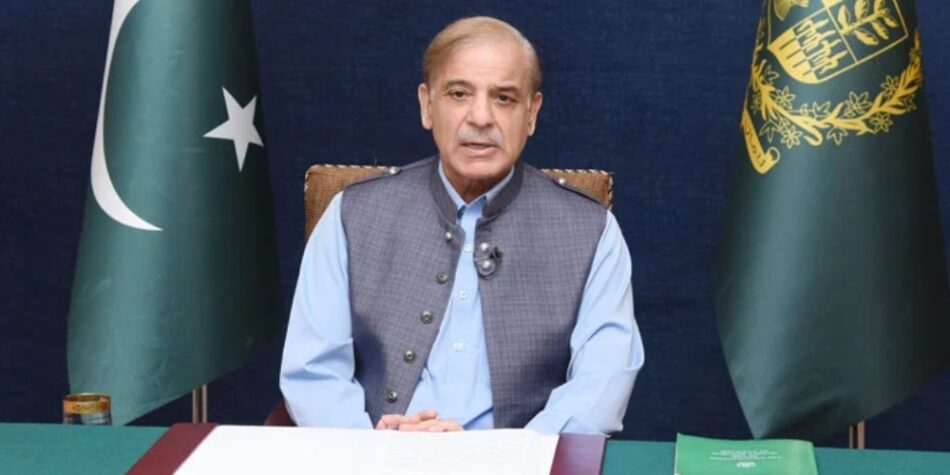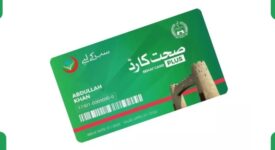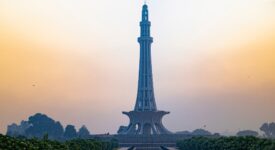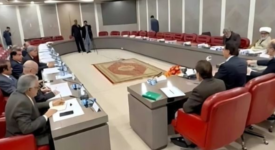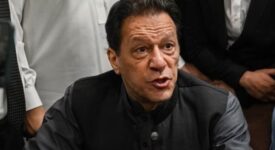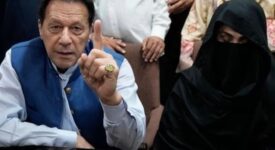Shehbaz Sharif was chosen by the parliament on Sunday to serve a second term as prime minister of the nation.
Shehbaz, the president of his Pakistan Muslim League-Nawaz (PML-N) and younger brother of three-time prime minister Nawaz Sharif, beat rival Omer Ayub Khan of the incarcerated previous prime minister Imran Khan’s Pakistan Tehreek-e-Insaf (PTI) party with 201 votes in the National Assembly.
After a successful parliamentary no-confidence motion against Khan, the 72-year-old cancer survivor held the position of premier from April 2022 until August 2023.
Shehbaz was born in Lahore, the capital of Punjab, on September 23, 1951, into a Kashmiri family who spoke Punjabi. Some commentators refer to him as a “tough administrator” who knows the “art of governing.”
During his three stints as chief minister of Punjab, the richest and largest province in the nation, from 1997 to 1999, 2008 to 2013, and 2013 to 2018, his administrative ability was well-praised.
His 16-month term as premier, meanwhile, did not win over many people. The nation was on the edge of default before receiving a last-minute rescue from the International Monetary Fund (IMF) in July of last year due to a faltering economy and a rising cost of living crisis that had worsened during his administration. However, his government pointed the finger at the catastrophic economic condition of Khan’s former administration.
Over 12 million Pakistanis have fallen below the poverty line in only the last year, according to a World Bank report released last week.
Around 40% of the 240 million people who call this country residence currently reside below the dangerous level.
Early Life
Originating in the Anantnag district of Indian-administered Kashmir, the Sharif family later made Amritsar, in the Indian state of Punjab, their home. This was in the early 1900s.
They eventually moved to Lahore in 1947 after India and Pakistan were split up into two sovereign nations.
The family’s large home, dubbed “Jati Umra” after their ancestral hamlet in Amritsar, is situated in the northern suburbs of Lahore.
Mohammad Sharif, Shehbaz’s father, was an industrialist from the upper middle class who built a small plant far from Lahore and began manufacturing steel.
The second of Sharif’s three sons, Shehbaz, received early education at Lahore’s Saint Anthony’s High School while going on to the renowned Government College University to receive a Bachelor of Arts degree.
In the early 1970s, Shehbaz joined his family business with his older brother Nawaz.
Their factories had been placed under state control in 1974 as part of the controversial nationalization program of previous Prime Minister Zulfikar Ali Bhutto; however, they were returned to private hands in 1977 when the Bhutto government was overthrown by a military coup led by then Army Chief Gen. Zia-ul-Haq.
Shehbaz, a father of four children (two sons and two girls), had a total of three marriages. He has two wives at present.
He was married to Nusrat Shehbaz in 1973 and she was the mother of all of his children.
In the elections held on February 8, Hamza Shahbaz, his eldest son and political heir, was also chosen to represent Lahore in the National Assembly.
Political journey
When martial law was in effect in the whole country in the early 1980s, the Sharif family entered politics.
As the youngest finance minister to join the provincial Cabinet, Nawaz was the first member of the family to enter politics, gaining the support of Punjab Governor Gen. Ghulam Jilani at the time.
The Sharifs are sarcastically referred to by their political rivals as the “offspring of martial law and Gen. Jilani.”
In 1988, Shehbaz won a place in the Punjab Assembly, and two years afterwards, in the National Assembly.
In 1993, he was elected to the Punjab Assembly once more, and he led the opposition until 1996.
Although he was initially elected chief minister in 1997, the Nawaz Sharif government was overthrown in a bloodless military coup in October 1999 by then Army Chief Gen. Pervez Musharraf, ending his tenure in office for little over two years.
When the Sharif brothers were tried for hijacking a commercial airliner, Nawaz was given a life term in prison in April 2000 for giving orders that he later changed, ordering ground control to deny an airliner heading for Karachi permission to land, thus forcing it out of the nation. General Musharraf, who took over in a coup that same day, was one of the people on the jet.
The Sharif family went into exile in Jeddah, Saudi Arabia, in 2001 and stayed there for six years as a result of an arrangement mediated by the late Saudi King Abdullah bin Abdul Aziz.
After the family moved back to Pakistan in 2007, Shehbaz won a second term as Punjab’s chief minister in the general elections of 2008, serving out his five-year tenure in 2013.
He was elected to a third term as chief minister in 2013 and held the position till 2018.
He was chosen to join the National Assembly in 2018 and led the opposition until Imran Khan was removed in April 2022 due to a no-trust vote.
After Nawaz was declared ineligible by the Supreme Court in the wake of the 2016 Panama Papers scandal, he was selected as the PML-N president in 2017.
His ability to handle bureaucracy as chief minister of Punjab enabled him to develop a reputation as a skilled administrator.
Lahore, one of Pakistan’s developed cities, is said to have been established by Shehbaz.
His development of the province’s communication and transportation systems, particularly in rural and tiny towns, is especially admired.
The Sharifs have frequently been charged with corruption. Shehbaz, Nawaz, and their two sons have been involved in multiple corruption cases.
Their business growth during their time there sparked interest. However, they reject the charges and describe the cases as “political victimization.”
Tilt towards China, Türkiye
As a stark contrast to Khan’s chilly connections to Washington, which he claims is planning his downfall, Sharif has urged for stronger ties with the US, describing them as vital for Pakistan.
Shehbaz tends to Pakistan’s longtime allies, China and Turkey, according to observers.
In 2015, senior Sharif’s cabinet signed the $64 billion China-Pakistan Economic Corridor project, which is a component of China’s Belt and Road Initiative.
During his last tenure, Shehbaz tried to develop Punjab along the Turkish model.
Several Chinese and Turkish companies are working on projects in Punjab that were started by Shehbaz.
Lahore has named several major locations after former president Abdullah Gul, Istanbul, and Turkish President Recep Tayyip Erdogan.
Confluence of challenges ahead
Analysts note that over the next five years, Sharif will be put to the test by an array of issues like a faltering economy, growing political instability, and the potential threat of a terrorism revival.
The economy of the country, which is in terrible health right now, will be Sharif’s largest challenge, according to economist Shahid Hasan Siddiqui of Karachi.
“For the new premier, the road ahead will be rocky. For the first several years at least, we shouldn’t expect a miracle in terms of the economy, Siddiqui told Anadolu.
As Shehbaz himself has hinted at, the next government must negotiate an additional package with the IMF to keep the economy afloat, according to Siddiqui.
With the PTI and other parties accusing the polls were rigged, and allegations that the caretaker government and electoral power refuted, many political experts do not believe that tensions will soon begin to ease.
Former Pakistani ambassador to the US Maleeha Lodhi told Anadolu that “the new government will not be able to focus on fixing the economy without political stability.”
To address this specific issue, she suggested that the newly formed management initiate a “reconciliation process.”
“All those elected to parliament need to go through a reconciliation process,” she said.
Security will continue to be a key test for the new government, according to Mahmood Shah, a retired army officer and security analyst based in Peshawar. This is because terrorism has risen recently.
“To curb the fresh outbreak of terrorism, which is directly affecting the economy and politics, the new government has to adopt a multi-pronged security policy,” Shah told Anadolu.
Terrorist attacks in Pakistan have increased since the Afghan Taliban retook control of Kabul in 2021.

